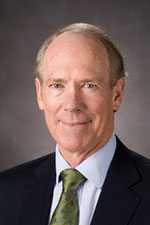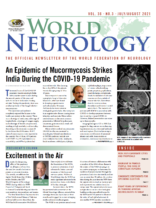
William Carroll, MD
By Prof. William Carroll, WFN President
Despite the dampening effect of the pandemic on all aspects of our lives, the next few months look set to present a welcome diversion. This month, we celebrate the Eighth World Brain Day (WBD), and in October, the XXV World Congress of Neurology (WCN) during which the WFN Council of Delegates will hold its Annual General Meeting and elect the next president, vice president, and trustee.
The first World Brain Day was the idea of Prof. Mohammad Wasay of Pakistan and was held in 2014. Since then, the WFN has held consecutive World Brain Days on July 22 to celebrate the foundation of the WFN, to promote awareness of and advocate for better care and treatment of the brain and nervous system. With each World Brain Day, the WFN has made significant advances in the preparation, focus, and delivery of the key messages.
In recent times, the WFN has partnered with a member of the Global Neurology Alliance, extended the campaign from one day to two or three months and engaged in an ever-enlarging media and social media program.
The WBD is our premier annual event. It’s a time of intense collaboration with a member of the GNA whose disease is the subject of the WBD campaign. In successive campaigns, we have seen the numbers of people reached through the promotional activities rise steadily and are now at more than 50 million. At no other time during the year does the WFN have the opportunity to reach so many people and to promote our mission in such a unique way. The opportunity to focus on a single disease or area of neurological health provides unparalleled scope for the WFN and GNA partner to illustrate the value of such global advocacy. It also enables WFN member societies to connect with the WFN over a two- to three-month period in the latter half of each year.
The WFN is indebted to the WBD Committee chaired by Prof. Tissa Wijeratne and to our media partner, Yakkety Yak, headed by Ashley Logan.
This year, we are proud to have the Multiple Sclerosis International Federation as partners in the promotion of the need for effective treatment for MS. There are highly effective treatments available that can dramatically reduce the rate of disability accrual, and in some instances reduce the level of disability, but they are woefully inaccessible to large numbers of people with MS. Indeed, this campaign is as much about informing people of the benefit of highly effective treatments as it is about highlighting the inequities of access to those therapies. Inequity of access to neurological services and to brain health in general is a core focus of the WFN which it, in turn, shares with the WHO.
The WCN is the premier biennial event for the WFN where the educational effort is focused on advancing the knowledge and practice skills of neurologists, particularly young neurologists. The effort that the WFN and Kenes, our PCO, make for the WCN to be presented as one of the pre-eminent educational opportunities is enormous but worth it. This effort, and the recognition of it, depend almost entirely on the Scientific Program Committee and its chair. We are indebted to Prof. Chris Kennard for his outstanding devotion to the 2019 WCN and this upcoming World Congress. He joins a number of other celebrated senior figures who have each built an admirable record for the WCN programs. After the 2021 Congress, Prof. Kennard will step down and his place will be taken by another worthy individual.
The chair of the Scientific Program Committee must have broad neurology experience including at clinical, scientific, and academic levels. The chair must also be aware of the historical development of neurology and its specialties and the evolving trends. It is the crafting of this perspective with the selection of the leading teachers and lecturers that is a skill often not acknowledged by us. The WFN has benefited greatly from the efforts of Prof. Kennard.
A World Congress of Neurology is a unique event. Although large annual neurology congresses, such as the AAN and EAN annual meetings, are held in different locations within North America and Europe and provide the neurological fraternity with essential updates, the WCN has the ability to complement them both by rotating locations around the world. The WCN, located in a different world region and developed over two years by a Scientific Program Committee influenced by that region, attracts neurologists, young neurologists, and training physicians who might otherwise not be exposed to a major neurology meeting. The opportunity for neurologists in that region to meet, mingle, and interact with an international faculty and colleagues is a profoundly important feature of the WCN. The WCN is also where the prestigious medals are awarded; please see box on page 12 for this year’s awardees.
Of course, each World Congress is the product of a team effort. For 2021 first and foremost is the Society of Italian Neurologists (SIN), the host Member Society, who joined with the WFN to form the key WCN committees. Together with the WFN PCO, Kenes, the committees developed the program with valuable contributions from members of the Global Neurology Alliance, WFN regional organizations, and industry. The role of the Society of Italian Neurologists for this World Congress is remarkably different from usual. Instead of welcoming delegates to the Eternal City, the Society of Italian Neurologists has had a different experience due to the current pandemic.
Working with Kenes and the WFN, they have prepared a spectacular entry point for this virtual World Congress of Neurology, no less than the famous Colosseum. The arriving delegates will also be welcomed by music of Ottorino Respighi or Antonio Vivaldi as they select from an average of 33 sessions to attend each day.
The contribution from the Society of Italian Neurologists has been nothing less than outstanding. Every potential difficulty has been solved promptly and amicably, building an expectation of an outstanding virtual World Congress of Neurology. The WFN is deeply appreciative of the efforts of Antonio Federico, Congress president; Gioacchino Tedeschi, SIN president; and Bruno Giometto, Alfredo Berardelli, Gianluigi Mancardi, and Barbara Frati.
The third and final of these three anticipated events is the Annual General Meeting of the WFN Council of Delegates. It will be held Oct. 2, 2021, the day before the World Congress commences. As in 2020, elections will be electronic so that all eligible member societies will have the opportunity to vote at a time of their choosing.
The results will again be announced during the AGM. Voting this year will be particularly important. Member societies will elect a new president from three candidates and new vice president also from three candidates, and for one elected trustee for the Federation. The elected trustee will take up that office from Oct. 3, and the elected president and vice president from Jan. 1, 2022. Member societies will also decide by vote the venue and host society for the World Congress of Neurology 2025. Information concerning the procedures and timetable for these important elections will be communicated directly to each member society and can also be found on the WFN website.
I thank all who have contributed to the preparation of these upcoming events and look forward to seeing as many friends, colleagues, and member societies as possible participate in them, demonstrating to all that together we are stronger than the challenges we face. •
Previous World Brain Day Topics
2014 Brain Health
2015 Epilepsy (ILAE)
2016 Brain Health and Ageing (ADI)
2017 Stroke (WSO)
2018 Clean Air for Brain Health (WFN Environmental Neurology SG)
2019 Migraine (IHS)
2020 Parkinson’s Disease (IPD and MDS)
